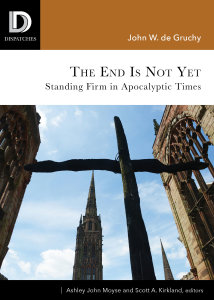-
Theology and the Globalized Present: Feasting in the Future of God
Theology and the Globalized Present focuses on the world's future in God and God's creativeness. In response to a globalized economy that reconfigures time to the...
$4.50
$18.00Save 75%
-
Theology, Comedy, Politics
What is the relevance of comedy for the global crises of late-modernity and the theological critique thereof? This book develops recent philosophical, anthropological, and psychoanalytical studies of humor to develop a theology of comedy. It argues that comedy not only participates in the divine, but that it should inform our liturgical, sacramental, and ecclesial life if we are to respond to the postmodern age in which having fun is an ideological imperative of market forces.
$4.50
$18.00Save 75%
-
Political Orthodoxies: The Unorthodoxies of the Church Coerced
Dispatches on nationalism and religion As an insider to church politics and a scholar of contemporary Orthodoxy, Cyril Hovorun outlines forms of political orthodoxy in...
$18.00
-
The End Is Not Yet: Standing Firm in Apocalyptic Times
The title of this book comes from Matthew 24:6–8: “You will hear of wars and rumors of wars; see that you are not alarmed; for...
$4.50
$18.00Save 75%
-
Theology in the Capitalocene: Ecology, Identity, Class, and Solidarity
Joerg Rieger takes a new look at the things that cause the growing destruction and death of people and the planet. And yet, understanding is only a start. Solidarity and the willingness to work at the intersections--the triad of gender, race, class, and more--must mark the work of theology.
$24.00
-
The Art of Living for A Technological Age
The Art of Living for A Technological Age sketches the crisis of our late modern age, where persons are enamored by the promises of progress and disciplined to form by the power of technology--the ontology of our age. Yet, it also offers a response, attending to those performative activities, educative and transformative social practices that might allow us to live humanly and bear witness to human being (becoming) for a technological age.
$4.50
$18.00Save 75%
-
Interrupting a Gendered, Violent Church
Working at the intersections of gender studies and Christian theology--particularly diverse feminist and queer theologies--this book points to the real ways churches foster violence around gender. This volume discusses this violent reality while also exploring church as a nexus for resistance to gender-based violence.
$23.00
Dispatches

Dispatches draws on the legacy of early twentieth century theological responses to the crises of the two world wars. During World War II, the Signposts (Dacre Press, 1940) series sought to offer an interruption of a theological malaise in the midst of mass violence and destruction. Contributors from that series, including Julian Casserlay, Eric Mascall, Donald MacKinnon, and others, offered slim volumes, which drew from diverse resources and harnessed the apocalyptic political urgency of the dialectical school within the theological grammar of a more traditional Anglo-Catholic Thomism. Similarly, and inspired significantly by MacKinnon’s contributions, this present series draws on diverse theological resources in order to offer urgent responses to contemporary crises.
While the title of the series conveys the digest nature of the volumes, the subtitle, Turning Points, indicates the apocalyptic urgency of the issues addressed. Yet, there is no prescriptive theological stream within which the tradition is to be re-appropriated by our authors. The goal of the series is to offer a genuinely creative and disruptive theological-ethical ressourcement for church in the present moment. With conceptual agility and faithfulness this series will provide intelligent and yet accessible reflections on the shape and form of theological life in the present.
Dispatches will illuminate and explore, creatively and concisely, the implications and relevance of theology for the global crises of late-modernity. Our authors have been invited to introduce succinct and provocative arguments intended to provoke dialogue and exchange of ideas, while setting in relief the implications of theology for political and moral life.






